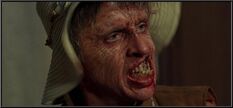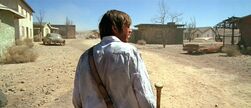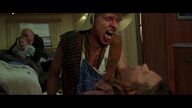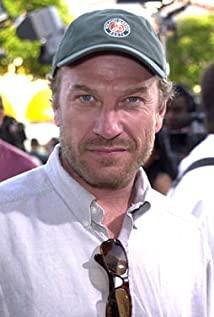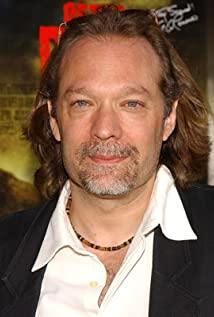It was night, watching this film with friends in the school theater, it was indeed a lot of thought. The film's claim to horror is achieved with the help of instant savages, brutal hunts, bloody fights, and a few screams of flesh made of water while watching the film. However, behind the impact of barbarism and civilization, perversion and normality is the loss of human nature and the decline of morality.
The director of this film can resonate with the audience very much. Many audiences have placed themselves in the civilized world from the beginning, and listed those who share the so-called advanced technology with them as their own kind, and will be killed in the massacre. The surviving biologically bizarre people are listed as enemies. Therefore, every "civilized person" is killed, and every "savage" is killed with thunderous applause. The positive characters in the film are still people who are "kind-hearted" and surrounded by various civilizations, while the negative characters are still "crazy" people who have been poisoned by various civilizations. From this point of view, they are lucky to survive in the mine. It is reasonable that nine of them were killed successively. The existence of any one of them is an indictment of civilization and a mockery of human nature. Therefore, they all have to die, even those with maternal and human nature are no exception. In this way, barbarism and backwardness have been eliminated, and the world is at peace.
The film makes a romantic family act as a representative of civilization. In order to make this family appear real, the factor of discord between the father-in-law and the son-in-law is deliberately added, but it is only a drop in the bucket. It is true that they are not easy to kill, and they have never abandoned their humanity in order to survive. They were only forced to fight back when they were attacked, and even when the son-in-law was saving the child, he simply wanted to save the child instead of killing anyone. However, the mistake is that they are not representatives of all civilizations. They can represent a series of colorful bubbles such as freedom, equality, and democracy in a strong society, but they cannot represent the law of life and death between the strong and the weak, and the rule of life and death between the strong and the weak. Through them, it is possible to vigorously praise the civilization of a civilized society and ridicule the barbarism of a barbarian society, but the stealing of the subject makes it somewhat pale and weak.
The suicide of the oil worker can also be simply seen as a result of human nature. He couldn't bear to be the guide of the executioner and finally left the world in a cruel way. If you look closely, it may not be the case. The refueling workers acted as pawns for "desert creatures (let's call them the survivors)" for some unknown number of years. No peace. It is not like the king of the six kingdoms who "cut five cities today, ten cities tomorrow, and then sleeps peacefully overnight." Moreover, living on the side of tigers and wolves, his mind is exhausted, and life is difficult to rest, only death can be terminated. He did not die from the condemnation of his conscience, but from the various burdens imposed on him by the "desert creatures".
"Desert creatures" originally lived in a rich and noble land, a land of gentleness, and were born deformed for various reasons. In order to cover up the troubles, the creators of "All Reasons" forced these deformed children into the mines and detonated them. If the person who first dehumanized was the original creator of this crime. The surviving people's physical deformities and inhuman experiences make them psychologically abnormal and their behaviors are different from ordinary people. They blame all the unfair treatment on the civilized people of the civilized society and make a living as hunters. Fortunately, they did not completely lose their humanity. They did not die from their own brutality, but from what was left of their humanity. If the baby dies, there will be no more grief than the death of the heart, and the son-in-law will have no strength to fight the five desperadoes alone. They used love as bait, or scolded the east and the west, or turned the tiger away from the mountain, and finally the family of eight was tragically killed. This can only be regarded as their weak revenge against the civilized world, although the adjective of inhumanity is also used for weak revenge.
I have no intention of commenting on who is right and who is wrong in this life-and-death struggle in the desert. It is no longer important to be right or wrong under the collision of various human natures. The first to lose humanity must be the executioner who slaughtered deformed people, and the last to possess humanity is also the civilized man who came out of the executioner's hands. In this way, from the beginning of being killed to the final appearance of the revenge freak is the image of a loser. The former fails in strength, the latter fails in human nature, and deformed people are foils of civilization. Philosophers arguing about sexual good and sexual evil no longer make sense. In the desert of existence, only the victorious character can be called human nature or morality. A film of less than two hours tells me that's enough.
View more about The Hills Have Eyes reviews



